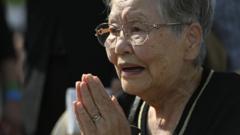On August 6, 2023, Hiroshima marked the 80th anniversary of the atomic bombing that devastated the city and its people, spotlighting the ongoing plight of survivors and the imperative for international peace and disarmament.
Hiroshima Commemorates 80 Years Since Atomic Bombing with Calls for Peace

Hiroshima Commemorates 80 Years Since Atomic Bombing with Calls for Peace
Hiroshima's memorial ceremony highlights the enduring impact of nuclear warfare and the urgent need for disarmament.
On Wednesday morning, a solemn ceremony took place in Hiroshima, Japan, commemorating the 80th anniversary of the atomic bombing carried out by the United States. The event was attended by Japanese Prime Minister Shigeru Ishiba, along with officials and representatives from various nations across the globe. Hiroshima Mayor Kazumi Matsui spoke at the Peace Memorial Park, reflecting on the historical significance of the bombing, stating, “Japan is the only nation that has suffered an atomic bombing in war.” His call for genuine and lasting peace resonates with the continued efforts of survivors and advocates.
The atomic bomb, dropped on August 6, 1945, resulted in the deaths of over 200,000 people, a majority succumbing to the immediate explosion while others faced the devastating consequences of radiation sickness and severe burns in the aftermath. The harrowing experiences of survivors were poignantly highlighted by Shingo Naito, who at six years old lost his father and siblings to the devastation. He recounts this trauma as his father, severely injured, could not even hold his hand. Naito has been sharing his painful memories with students in Hiroshima, who are transforming these stories into art as a means of remembrance.
Looking forward, the significance of remembering this tragedy continues to be underscored by the ongoing global tensions over nuclear weapons. In a recent speech, Matsui warned of escalating military build-ups and the misconception that nuclear arsenals are necessary for national security. He expressed concern that the nuclear Non-Proliferation Treaty, designed to prevent the proliferation of nuclear arms and foster peaceful energy use, is on the verge of collapse. Furthermore, he urged the Japanese government to ratify the Treaty on the Prohibition of Nuclear Weapons, which took effect in 2021 but has faced resistance from nuclear powers like the U.S. and Russia, as well as Japan, which relies on U.S. nuclear protection.
Public sentiment surrounding nuclear disarmament remains polarized within Japan, as evidenced by small protests that occurred nearby, advocating for the abolition of nuclear weapons. Survivors like Saitoshi Tanaka, who suffered from multiple cancers linked to radiation exposure, expressed a poignant connection between contemporary global conflicts, such as those in Gaza and Ukraine, and their past trauma. Tanaka articulated the urgent need for the international community to take decisive action against the threat of nuclear annihilation, calling for widespread outrage and mobilization from the global citizenry.
As Hiroshima reflects on the past, the collective consciousness serves as both a reminder of the horrors of war and a beacon for peace, urging future generations to strive for a world free of nuclear weapons.
The atomic bomb, dropped on August 6, 1945, resulted in the deaths of over 200,000 people, a majority succumbing to the immediate explosion while others faced the devastating consequences of radiation sickness and severe burns in the aftermath. The harrowing experiences of survivors were poignantly highlighted by Shingo Naito, who at six years old lost his father and siblings to the devastation. He recounts this trauma as his father, severely injured, could not even hold his hand. Naito has been sharing his painful memories with students in Hiroshima, who are transforming these stories into art as a means of remembrance.
Looking forward, the significance of remembering this tragedy continues to be underscored by the ongoing global tensions over nuclear weapons. In a recent speech, Matsui warned of escalating military build-ups and the misconception that nuclear arsenals are necessary for national security. He expressed concern that the nuclear Non-Proliferation Treaty, designed to prevent the proliferation of nuclear arms and foster peaceful energy use, is on the verge of collapse. Furthermore, he urged the Japanese government to ratify the Treaty on the Prohibition of Nuclear Weapons, which took effect in 2021 but has faced resistance from nuclear powers like the U.S. and Russia, as well as Japan, which relies on U.S. nuclear protection.
Public sentiment surrounding nuclear disarmament remains polarized within Japan, as evidenced by small protests that occurred nearby, advocating for the abolition of nuclear weapons. Survivors like Saitoshi Tanaka, who suffered from multiple cancers linked to radiation exposure, expressed a poignant connection between contemporary global conflicts, such as those in Gaza and Ukraine, and their past trauma. Tanaka articulated the urgent need for the international community to take decisive action against the threat of nuclear annihilation, calling for widespread outrage and mobilization from the global citizenry.
As Hiroshima reflects on the past, the collective consciousness serves as both a reminder of the horrors of war and a beacon for peace, urging future generations to strive for a world free of nuclear weapons.



















